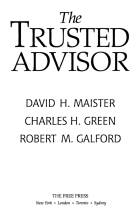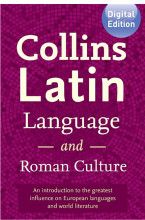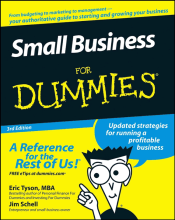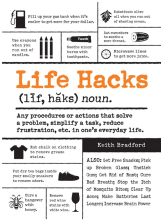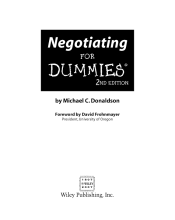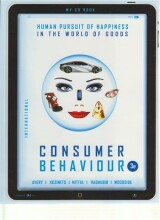Summary: The Trusted Advisor | 9781471109645 | David H Maister, et al
- This + 400k other summaries
- A unique study and practice tool
- Never study anything twice again
- Get the grades you hope for
- 100% sure, 100% understanding
Read the summary and the most important questions on The Trusted Advisor | 9781471109645 | David H. Maister; Robert Galford; Charles Green
-
1 A Sneak Preview
This is a preview. There are 2 more flashcards available for chapter 1
Show more cards here -
What are the three basic skills that a trusted advisor needs?
- Earning Trust
- Giving Advice Effectively
- Building Relationships
-
2 What is a Trusted Advisor?
This is a preview. There are 1 more flashcards available for chapter 2
Show more cards here -
What is the difference between the trust-based relationship and the others?
The difference is the human dimension, the recognition of the interpersonal, individual aspects of the relationship. -
What are the most prized individual skills and powers?
- Listening
- Reasoning
- Problem solving
- Imagining
-
What is one of the most significant rewards of a trusted advisor relationship, for both client and advisor?
That in such a relationship, the individuals are most able to be fully who they are.
The members of the relationship do not expend energy protecting themselves, and both can be open with information about their lives, their strengths, and their weaknesses. They share information and ideas, feel comfortable with themselves, and have great access to their emotions and inspirations. -
3 Earning Trust
-
What are the characteristicts of trust?
Specifically, it:- Grows, rather than just appears.
- Is both rational and emotional.
- Presumes a two-way relationship.
- Is intrinsically about perceived risk.
- Is different for the client than it is for the advisor.
- Is personal.
-
4 How to Give Advice
This is a preview. There are 4 more flashcards available for chapter 4
Show more cards here -
What is the advisor's job?
It is not enough for a professional to be right: An advisor's job is to be helpful. An advisor has to "earn the right" to be critical. Proving to someone that they are wrong may be intellectually satisfying, but it is not productive for either the client or the advisor.
The diagnosis and solution of a client problem can never be performed without considering the sensitivities, emotions, and politics of the client situation. -
What are clients looking for in a advisor?
Since clients are often anxious and uncertain, they are, above all, looking for someone who will provide reassurance, calm their fears, and inspire confidence. -
How can we diffuse defensiveness?
Defensiveness is always present. If we are to influence a parent or a client, we must find a way to prove we are trying to help, not to criticize.
It should be clear that we don't just tell Mom or Dad what to do (even if they ask us directly). Instead, we focus less on the advice (or conclusion) itself and more on creating a dialogue or conversation that helps them see the issue from a new perspective. -
What is an important quick rule in finding the right words to talk to your client?
It is usually better to ry to turn assertions into questions.
Instead of saying, "This is the best solution," try the following: "My other clients usually do X for the following reasons. Do you think that reasoning applies here?" -
What is a good process for the advisor to follow?
- Give them their options.
- Given them an education about the options (including enough discussion for them to consider each option in depth).
- Given them a recommendation.
- Let them choose.
Some clients may want you to choose for them. But that, too, is their choice. If they ask you to choose, a tactful way to respond to this is to say, "If this were my business or my money, I would do X."
- Higher grades + faster learning
- Never study anything twice
- 100% sure, 100% understanding
